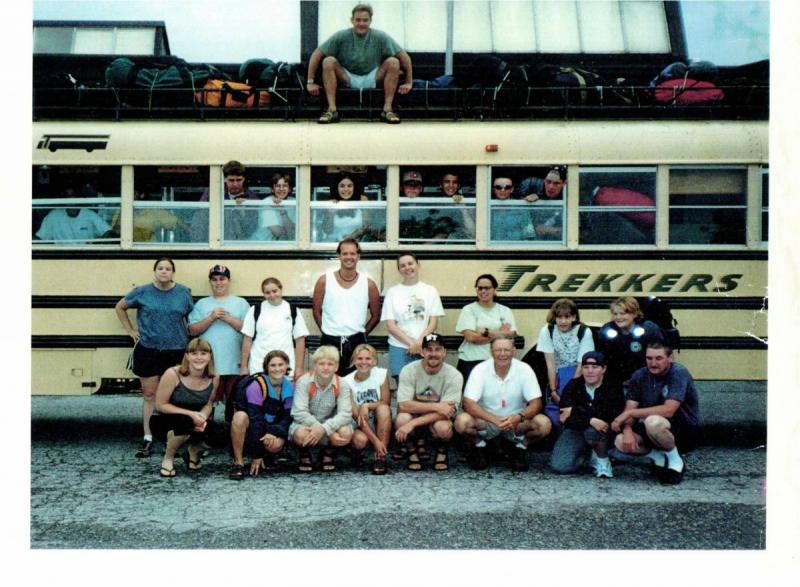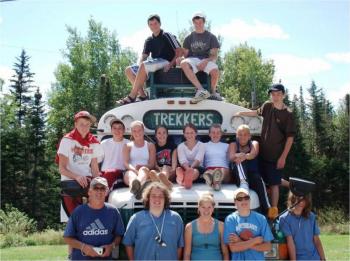THOMASTON — Last month, the nonprofit outdoor mentoring based program Trekkers celebrated its 20th anniversary. There was a talk by famous travel writer Paul Theroux and an auction of buoys decorated by local artists.
There were also three short speeches by Trekkers alumni, about how the program changed their lives.
Margaret Hoyt, who grew up on Clark Island, now lives in Portland and works for an environmental advocacy nonprofit.
“As I continued through the Trekkers program, my perception of the world got wider and wider, and my imagination grew bigger and bigger,” Hoyt said. “Trekkers exposed my narrow somewhat sheltered perspective to what else the world had to offer.”
According to Trekkers Executive Director Don Carpenter, giving students a chance to travel and grow, to “find their spark,” is part of what Trekkers is all about.
When the program began in 1994, it was a community initiative in Thomaston, designed to bring students together with caring adults through outdoor trips.
“They called it Thomaston Trekkers,” Carpenter said. “They were looking for a word that had a T in it that went with Thomaston.” The rest, as they say, is history.
At first the program only served seventh grade. Over time it grew, and in 1998 it followed that year’s seventh graders all the way to 12th grade, expanding the programming to include seventh to 12th grade students in the process.
As it grew into a six-year program, Trekkers also expanded its base, to include Cushing and St. George. In 2010 when RSU 13 was formed, Trekkers started accepting students from all six communities in the new school district.
Carpenter explained that the organization is just reaching the end of a six-year strategic expansion plan to strengthen Trekkers’ infrastructure and include more students from these communities in the core programming.
“On Tuesday we’ll start the fifth year of that expansion,” Carpenter said. “Our fiscal year kind of follows the school system. So, September marks our 21st year, and the fifth year of this expansion. When we get to 2016 we’ll have a total of 180 students in the core programming. And we’ll have probably another 100 or so in peripheral programming.”
The Trekkers model is all about relationships, Carpenter said. While it also offers a host of travel opportunities and outdoor experiences, at its core Trekkers is about what it says on the tin, “connecting young people to caring adults.”
“We’ll provide a tutor, we’ll provide a mentor, we’ll provide a one-on-one mentor. We’ll provide anything they need, in partnership with the families, to make them as successful as they can be within their junior high and high school experience,” Carpenter said.
Students go on a variety of trips over their six years in Trekkers. These trips include everything from rock climbing and spelunking to college visits and community service.
The core program culminates in a 36-hour solo wilderness experience in their senior year, a rite of passage to mark their transition out of the program and out of adolescence.
“It builds resiliency, it builds self-confidence, it builds an inner strength that really can’t be manufactured inside a classroom, many times,” Carpenter said of Trekkers’ outdoor programs.
While Trekkers has general outlines of where and what each class does for their trip, Carpenter explained that students are very involved in the planning process. They decide, through consensus, what they want to do as part of their experience each year.
The students also decide on standards of behavior, how many meetings someone can miss, how many failing grades they can have, before they are excluded from that year’s trip.
“That can be a really hard line to hold,” Carpenter said. “But we take a really long-term, wide angle approach. We’ve been doing this for 20 years. So, we know a student may stumble, may trip, may fall. And we’re there to support them during that time. But we’ve seen them be able to recover and come back and find success within our program.”
Carpenter said he is often asked whether the students in Trekkers are “at risk.”
“The overall program is really open to any student in the six communities that we serve,” Carpenter said. “We really believe in the value of inclusivity. And we also believe that it’s very difficult in today’s culture to define ‘at risk.’ We’re a preventative program. And what I mean by that is that we’re trying to work with students well before they have crisis, get into trouble, make mistakes. But we also believe that every student—no matter what background they have, what family situation, what economic circumstance—every student that we’ve ever worked with is one decision, one mistake or one crisis from being sent over the edge of being at risk. Our job is to build relationships with students before they come to that edge, so that if they do find themselves there we’ve got a relationship already and we can help families begin to find solutions and help students make healthier choices.”
Carpenter has been on staff with Trekkers for 17 years and he has seen the organization grow. He said he’s been particularly impressed by the “amazing” support Trekkers has received from the state and from business and people in the communities it serves. Volunteering went up 38% this year from last year, according to Carpenter.
Looking ahead to the next 20 years, Carpenter has some ideas. He would like to see Trekkers continue to grow and share its model and ideas with other communities.
“There’s not a community in the state of Maine, there’s not a community in the United States, that doesn’t desire to have a bridge between young people and caring adults that’s healthy,” Carpenter said.
However Trekkers grows and changes, Carpenter believes it will always stay true to its core ideal.
“What we’ve tried to do over the past 20 years is to build a youth development model that puts a life on a life,” Carpenter said. “That makes a commitment to a person’s life and says, listen, I’m going to have your back, I’m going to have your family’s back, and you can count on me as long as you want to be a part of this relationship, no matter what comes up. That’s the thing I’m most proud of. We haven’t lost ourselves in the midst of the expansion or in the last 20 years. We know what we do well. And that’s relationship building. Yes we plan great expeditions and yes we go to great places, and we’ve got three mobile classrooms that are awesome, it’s all wonderful and I’m very grateful, but they’re all pretty much a smoke screen for us building a relationship with a young person. And we haven’t lost sight of that in 20 years. All I can hope for is that as we move into the next decade, putting a life on a life is as front and center and as core to our mission as it ever has been and ever will be, no matter what evolves.”
For more information on Trekkers, click here.






























